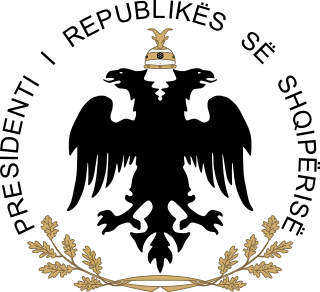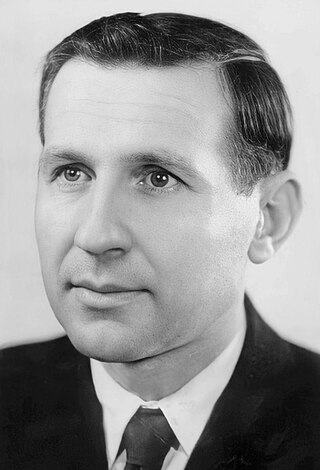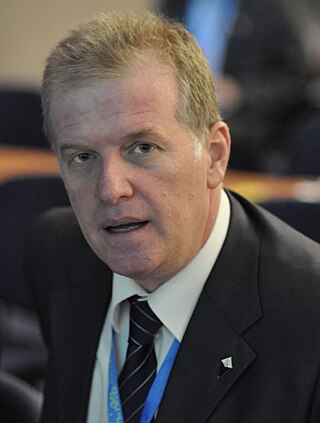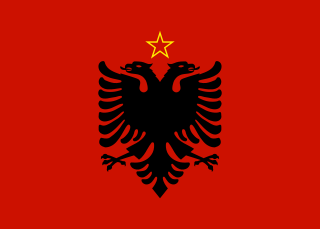
Ramiz Tafë Alia was an Albanian politician serving as the second and last leader of the People's Socialist Republic of Albania from 1985 to 1991, serving as First Secretary of the Party of Labour of Albania. He was also the country's head of state from 1982 to 1992. He had been seen as a successor by Enver Hoxha and took power after Hoxha died.

Sali Ram Berisha is an Albanian conservative politician and former cardiologist who served as the second President of Albania from 1992 to 1997 and Prime Minister from 2005 to 2013.

The president of Albania, officially styled the President of the Republic of Albania, is the head of state, commander-in-chief of the military and the representative of the unity of the Albanian people.

The State Intelligence Service, commonly known by its acronym SHISH, is the primary intelligence agency of Albania. It was preceded by SHIK.

Mehmet Ismail Shehu was an Albanian communist politician who served as the 23rd Prime Minister of Albania from 1954 to 1981.

Fatos Thanas Nano is an Albanian socialist politician who served as Prime Minister of Albania in 1991, from 1997 to 1998 and from 2002 to 2005. He was the first leader and founder of the Socialist Party of Albania and a member of the Albanian Parliament from 1991 to 1993 and 1997 to 2009. He reformed the anti-revisionist Marxist-Leninist ideology of the Labor Party of Albania into social democracy for its successor, the Socialist Party. During his leadership, the Socialist Party, as a result of reforms, joined the Socialist International and Party of European Socialists. Nano was a candidate in the 2007 presidential election but did not win. He again tried in the 2012 presidential election, but he did not even qualify as a candidate, because the leaders of parties in Parliament obstructed their respective MPs to elect him as candidate in the elections.

The Democratic Party of Albania is a conservative political party in Albania. It has been the largest opposition party in the country since 2013.

Azem Shpend Hajdari was the leader of the student movement in 1990–1991 that led to the fall of communism in Albania. He then became a politician of the Democratic Party of Albania (DP). He symbolizes the start of the democratic era in Albania. He was a member of the Albanian parliament and the Chairman of the Defence Parliamentary Commission. He was assassinated in Tirana on September 12, 1998.

Kastriot Selman Islami is an Albanian politician. Formerly member of the Communist Party of Albania, turned moderate Socialist. He was Chairman of the Parliament of Albania from April 17, 1991 to April 6, 1992. On April 3, 1992, when the last communist president, Ramiz Alia resigned, Islami served as acting president for three days. During the presidency of Sali Berisha (1992–1997), Islami had no important positions in the government, but from 1997 to 2005 he was an important person in the government again holding several Ministerial positions in the Socialist "NANO government". Most prominently he was foreign minister from 2003 to 2005, but lost his position in the cabinet when a new government was formed with Berisha as prime minister after the 2005 elections. He returned to Democratic Party on 7 May 2013 after he left the Socialist Party in March.
Bashkim Fino was an Albanian socialist politician who served as the 29th Prime Minister of Albania from March to July 1997.

The Albanian Civil War in 1997 was sparked by pyramid scheme failures in Albania soon after its transition to a market economy. The government was toppled and more than 2,000 people were killed. Various other sources also describe the violence that ensued as a rebellion, or a rebellion that gradually escalated into a civil war.

Genc Pollo is an Albanian conservative politician. An Orthodox Christian and trained historian, Pollo was co-founder and first spokesman of the Albanian Democratic Party. He first became a member of the Albanian Parliament in 1996 and has held various ministerial posts since 2005.

The People's Socialist Republic of Albania was the one-party communist state in Albania from 1946 to 1991 (the official name of the country was the People's Republic of Albania from 1946 until 1976. It succeeded the Democratic Government of Albania.

The fall of Communism in Albania, the last such event in Europe outside the Soviet Union, started in December 1990 with student demonstrations in the capital, Tirana, although protests started in January that year in other cities like Shkodra and Kavaja. The Central Committee of the communist Party of Labour of Albania allowed political pluralism on 11 December and the largest opposition party, the Democratic Party, was founded the next day. March 1991 elections left the Party of Labour in power, but a general strike and urban opposition led to the formation of a "stability government" that included non-communists. Albania's former communists were routed in elections in March 1992 amid economic collapse and social unrest, with the Democratic Party winning most seats and its party head, Sali Berisha, becoming president.
In 1991, the Socialist Party of Albania, with specific social democratic ideology took control of the country through democratic elections. One year later the Democratic Party of Albania won the new elections. After 1990, Albania has been seeking a closer relationship with the West. What followed were deliberate programs of economic and democratic reform, but the implementation of capitalism led to the proliferation of pyramid schemes. Chaos in late 1996 to early 1997, as a result of the collapse of these pyramid schemes, alarmed the world and prompted the influx of international peacekeeping forces. In 1995, Albania was accepted into the Council of Europe and requested membership in NATO and is a potential candidate country for accession to the European Union. The workforce of Albania has continued to emigrate to Western countries, especially Greece and Italy.

Bashkim Shehu is an Albanian writer who lives in Barcelona, Spain.

The 2011 Albanian opposition demonstrations were a series of anti-government protests in cities around Albania following 18 months of political conflict over alleged electoral fraud by the opposition. A video surfaced which portrayed the deputy prime minister arranging a corrupt deal with the minister of economy. The public outcry over the video resulted in the resignation of the deputy prime minister. A demonstration was called by parliamentary opposition parties, which include the Socialist Party and the Unity for Human Rights Party. These were called on 21 January in order to protest the alleged corruption of the Albanian government as well as widespread unemployment and poverty in the country.
The Fino Government better known as the Government of National Reconciliation was a caretaker government that presided over Albania from 13 March 1997 to 24 July 1997, during the Albanian Civil War. It was created as a result of the social, economic, and political turmoil of early 1997, spurred by the collapse of pyramid schemes and the subsequent loss of many Albanians' life savings. This government was formed in the week following the resignation of the government of Aleksandër Meksi on 1 March 1997 by the major political parties of the country with international support. The Government was voted in the morning session at 10:00 a.m. on 12 March 1997, while received the approval of the President Sali Berisha shortly before midnight on the same day.
The following lists events that happened during 2008 in Republic of Albania.
The Bufi Government better known as the Government of Stability was an interim government formed after the resignation of the previous Nano government due to the aggravated situation in the country after the events of 2 April 1991 where 4 opposition supporters were killed in Shkodër during a anti-communist protest that led to the burning of the Shkodra Labor Party Committee. The Nano government resigned on 4 June 1991, and the next day the then-President Ramiz Alia, began negotiations to form a comprehensive government whose main objective would be to restore stability to the country, from which it took the name "Stability Government". Ylli Bufi was accepted also by the opposition to be appointed as Prime Minister, while one of the most prominent figures of the Democratic Party, such as Gramoz Pashko, was appointed Deputy Prime Minister.













